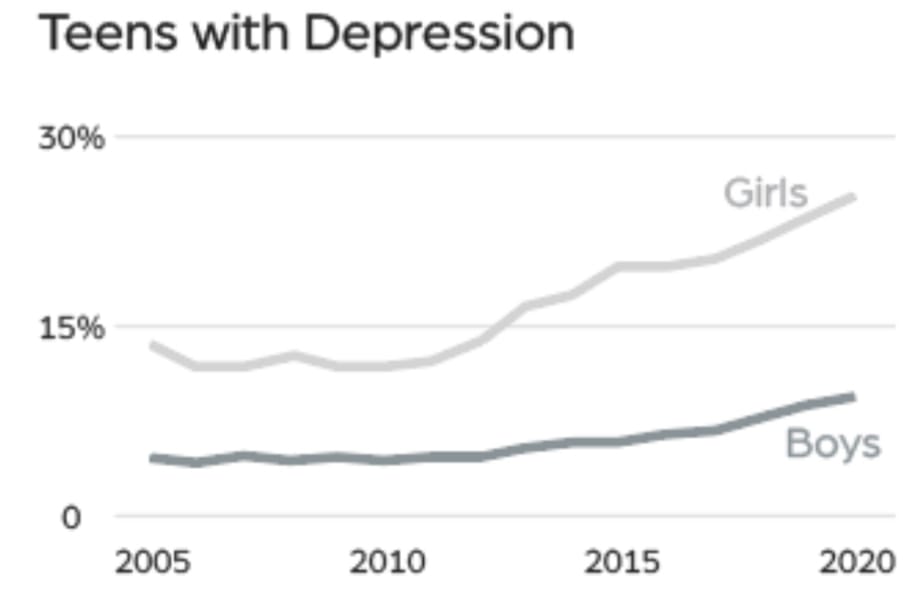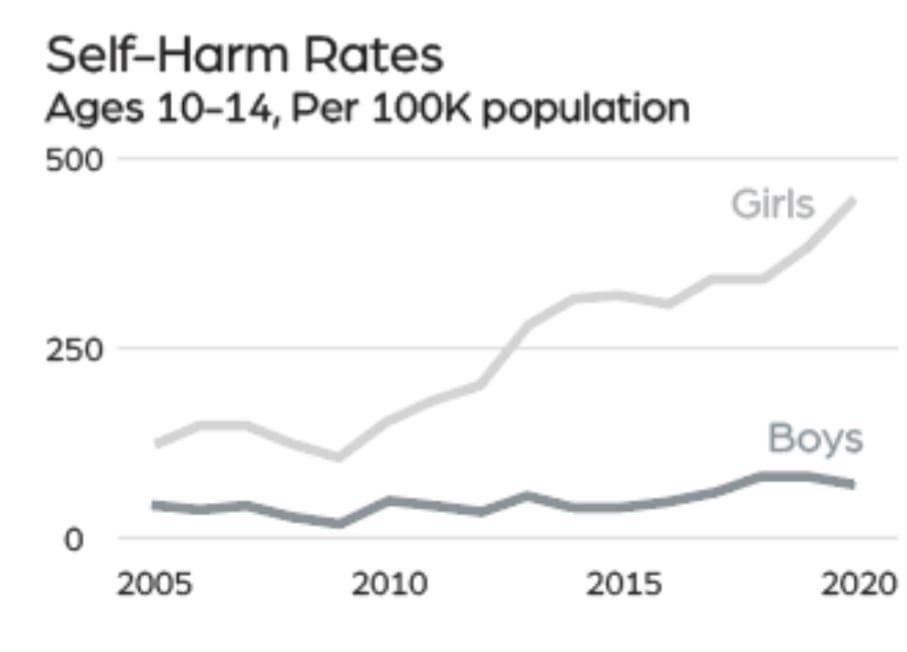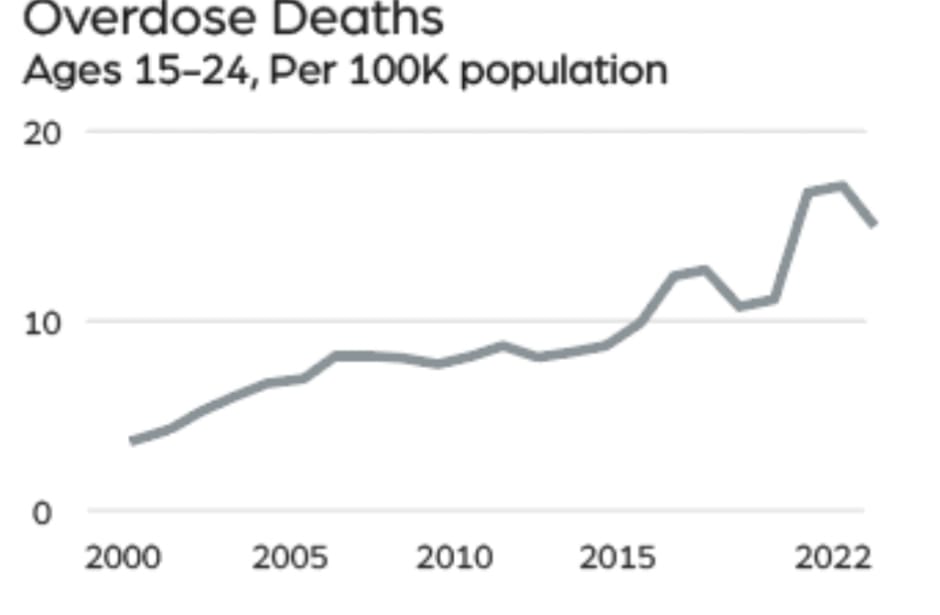I like to ask hard questions to stimulate conversations about the things that matter. It’s what I do. So, hold on to your knickers ‘cause this one’s gonna be a doozy.
Today’s kids are the product of the most mental health interventions, the most therapy, the most anti-anxiety meds, and the most understanding and empathetic parents in history. However, they are also the most anxious, depressed, medicated, lonely, sad, and fearful kids in history.

Courtesy Johnathan Haidt, Washington Post
Hall of Fame Parenting
As parents, we sought to be the best parents in the history of parenting. We wanted to be everything our parents weren’t: empathetic, caring, engaged, and aware of our kids’ every emotion—quick to identify any sign of struggle. You know, Hall of Fame parents. After all, we all know the stats on anxiety, depression, and self-harm. No one wants their kid to be a statistic.

The simple truth is, there’s not a kid left in America under age 15 who hasn’t lost a friend, classmate, or acquaintance to suicide. My first friend didn’t commit suicide until I was out of college. Things are different now, and we all know it. My daughter lost one of her best high school friends to suicide. I wrote about it here.

Courtesy of sofatutor
Is It Our Fault?
So, the question is simple. In an effort to be the kindest, most caring parents in history, is it possible that we overreacted? Is it possible that we did the wrong things? Is it possible that we made the problem worse by trying too hard to make the problem better?
Did you know that I record all of my articles for your listening pleasure? Find me on Spotify, Apple iTunes, iHeart Radio, or wherever you get your podcasts?
It’s the subject of an extremely controversial new book by Abigail Shrier called Bad Therapy: Why The Kids Aren’t Growing Up. Shrier raises these and other questions in an effort to peel back the onion. She dissects the mental health interventions that, in many cases, seem to be failing our kids, while in others, they appear to make matters worse.
After all, it’s wise to measure the outcomes of clinical interventions. It’s what the FDA does to determine if a medicine is safe and effective enough for the American public. But, who measures the outcomes of the various therapeutic interventions we use on our kids?
Every single year the number of kids suffering from anxiety and/or depression goes up. Every single year. With all this therapy, medication, and awareness, shouldn’t we be “curing” more kids? Shouldn’t the number be going down?

All Care is Not the Same
Don’t get me wrong. I’m an ardent fan of getting people to the right help at the right time. There is an enormous number of incredible mental health professionals who do God’s work of saving lives every day.
But, just like chiropractic care, all providers are not the same. Anyone who’s been to a chiropractor knows that the treatment plan typically involves, you know, more chiropractic care. There are some fantastic “Back-Crackers” and some that are downright frauds.
Since it’s just you and me talking, I’m gonna say this out loud. The key to a successful chiropractic practice, like a successful therapeutic practice, is recurring revenue. A long-term client becomes an annuity. If you cure someone entirely, they’re no longer a customer. Everybody knows that, right?

For Better or Worse?
So, now that we’ve made mental health mainstream and put counselors in the schools and churches—now that we’ve truly de-stigmatized mental health for an entire generation of kids, isn’t it a good time to pause and see if things are getting better?

After all, if you are treating cancer with a certain drug protocol and the outcomes suggest that nobody seems to be getting better, we’d question whether that protocol is effective, right? Of course, we would.

Courtesy of Stephen Andrews
There was a time in this country when we treated nearly every malady with bloodletting. Infection, virus, cancer? The answer was simple. The doctor would apply leeches to suck the “bad blood” out of your body so it could make some fresh blood. George Washington requested to be bled with leeches to cure his throat infection. He died.

Courtesy Laura Nyhuis
We also used maggots to clean wounds since, you know, they only ate dead tissue. But, alas, we learned that these things didn’t work so hot. We learned by assessing the outcomes.
First time reading? Join 25K others and sign up here for more thought-provoking conversations. C’mon, it’s free, forever.
Do No Harm
In the book, Shrier draws on hundreds of interviews with child psychologists, parents, teachers, and young people. She explores the ways the mental health industry has transformed how we teach, treat, discipline, and even talk to our kids.
Perhaps the most unsettling information involves the degree to which today’s public school teachers attempt to play child psychologists. What real training do they have? What ethical guidelines protect our children?
Shrier reveals that most of the therapeutic approaches for kids have serious side effects and few proven benefits. Among her unsettling findings:
Talk therapy can induce rumination, trapping children in cycles of anxiety and depression.
Social-emotional learning handicaps our most vulnerable children, in both public schools and private.
“Gentle parenting” can encourage emotional turbulence and even violence in children as they lash out—desperate for an adult in charge.
The Big Finish
So, did Abigail Shrier get it right? Should we be looking more critically at the interventions we are using on our kids? Have you had a good or bad experience with people entrusted to care for your child’s emotional needs? I want to hear about it. Hit the button below and tell me what you think. I read and respond to every comment. Even the ones that suggest I’m a cotton-headed ninny muggins cause, you know, I’m a work in progress.
I’m also a team of one—no entourage or security detail. I research and write purely for the joy of starting thought-provoking conversations with people like you and rely solely on referrals to grow my audience. If you know someone who enjoys thought-provoking conversations, forward this article and encourage them to sign up here.


